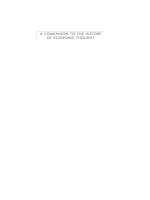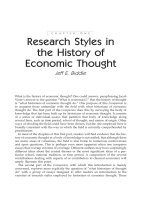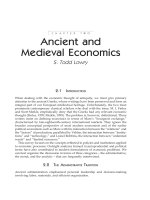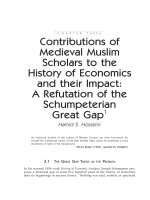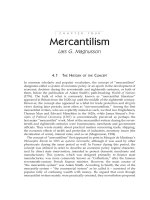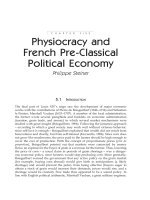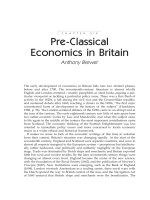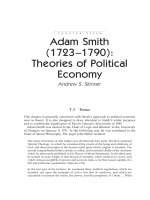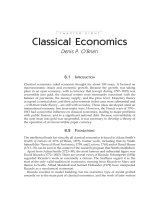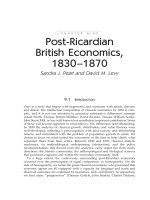Aristotles economic thought
Bạn đang xem bản rút gọn của tài liệu. Xem và tải ngay bản đầy đủ của tài liệu tại đây (3.9 MB, 223 trang )
Aristotle's Economic
Thought
SCOTT MEIKLE
CLAREl\'DON PRESS
1995
OXFORD
OxfcmJ Un,wr111)1 Pms, Wallon Simi'!, OxfcmJ ox2 6or
Oxf
Calcull<1
ea,.
TOU111 Dar a Salaam D,/hi
Flor- H.,,., Kon, /naMIII Karat:hi
Kuala Lumpur Madros Madrid Mtlbouffll'
Mt:nco Cicy Nairobi Paru Sin«aport
Tai,,_; Toliyo Toronlo
andassa,;;.,kacampan~
,n
Bnlin/bcidan
Oxford.
ti
a tTad, marli of Orford. Uniwnil)I Prm
Publuhed in IM Uni/GI Scald
by Oxford Un1wml)I Prm /,u:, Ntiu Yori,
eseoc1Mrilikl99.5
AU ri,rhi. rtlnWd. No part of lhis pubhcah"" may I,,, rq,rodtsaJ.
sr.,rfd 111 a retrieval J)IJ/wiclwut tM prior pnmwion in wrilin« of Oxford Uniwnil)I Pru,
W11h,n lht UK, uc,p11ons au <11/owtd in mptd of any f<1ir CU<1hn,f for //u,
pu,p
'"P'llf'"ph1ercproduc1ion inac:cord.i11Uwilh 1/wkmuo/rh, /iunc.es
wwd by Che CCIJ'Yl"'llhl Licmsin,f A,gmcy. Enqu,nn conum,..,.
rq,...ducrion<n1ind.elhtukmuondinolM'«>11nlriashot,ldbr
unr co clu, R;,hi. D.,,..r1111m1, Oxford Uniwnil)I Pross.
<1l1Maddroudbow
British Liln-,iry C:11<1/opin,f in Pultlia11ion 0414
D<11<1<111<111.aWt
L1br<1ry of Cong,tss C:ilalogi"l
,n
Public..1,on O..ra
Mnlrlr,S,;ou
Ansro1k", uonomit 1ho,ch1 I S,;o11 M~lilt
/ndPdu ln"blicgrophicJ Aruror/,- Conrnbuhorum"""'"°"'"" 2 Econmnia
I T,tl,
11B77 M-4.5 199.5 330 dc20 95 -10594
ISBNO J98UOl)24
13579108642
St1bylla,,.StrV1U1(Abin,don)Lld
Pnnka in
(i,,.., 8n1<11>1
on.u,d-f,..p<1pnby
BidrllnL1d,
Guildford f!f Kine'• Lyr1n
History
To Kirsten
ACKNOWLEDGEMENTS
It is a pleasure to thank my friends and colleagues Pat Shaw
and Chris Martin for reading large parts of the manuscript,
and for much critical discussion. To Hillel Tick tin and Geoff
Kay I owe a special debt for having introduced me to the
murky depths of exchange value.
Some of the material has appeared in print before. I am
grateful to the Journal of Hellenic Studies, Polis, the Classical
Quarterly, Phronesis, and Basil Blackwell, for permission to
make use of it here.
Lindsay Judson's article 'Aristotle on Fair Exchange' deals
in part with an earlier article of mine on the same subject,
which appeared in the Journal of Hellenic Studies in 1991, and
which reappears in a slightly altered form as Chapter 7 of the
present book. Judson's article also presents arguments addressing issues that are fundamental to the interpretation of
Aristotle offered here, but it unfortunately reached me too late
to be taken account of
Translations are always from Ross, Rackham, Barker, or
Irwin. On the few occasions when another translator has been
used, this has been indicated in the text.
I acknowledge the granting of one term of study leave
towards preparing the book by the Department of Personnel
Services (Academic) of Glasgow University.
S.M.
Glasgow
1994
Abbreviations
vm
Introduction
1
1 Exchange Value: Nicomachean Ethics, 5. 5
6
2
Ch-reia and Demand: Nicomachean Ethics, 5
28
Exchange: Politics, 1
43
4
The Integrity of the Analysis
68
5
Money: Politics, 1. 8-10
6
Neo-Classical Interpretation
87
110
7 Justice in Exchange: 'As Builder to Shoemaker'
129
8
The Ancient 'Economy' and its Literature
147
9
Nature and Commensurability
180
Bibliography
201
Index
212
ABBREVIATIONS
The works of Aristotle are abbreviated as follows:
Cat
De Gen. An.
De Part. An.
EE
/IA
M,t
MM
NE
Categories
De Generatione Animalium
De Partibw Animalium
Eudemian Ethics
Historia Animalium
Metaphysics
Magna Mo-ralia
Nicomachean Ethics
Pol.
Politics
Rhet.
S. El.
De Sophisticis Elenchis
Rhetoric
INTRODUCTION
The influence of Aristotle's economic writing has beenjw.l,;
culablv i!eat, yet it amounts to fewer than half a dozen pages
of theftc"1ru1Chean Ethics and the Politics in the Bekker text.
It was the backbone of medieval thinking about commercial
behaviour and matters that we would call 'economic' .1 It still
provides the foundation for Catholic social teaching, and it was
an important influence in Islamic economic thought. It is usually held to be the first analytical contribution to economics,
and histories of economic thought usually begin with it. 2
Aristotle's theory of money substantially informed treatments
of the subject into the twentieth century, and most schools of
modern economic thought have had claims of Aristotelian
paternity made on their behalf, including Jevonian utility
theor~, mathematicaJ economics, neo-classical economics, and
The main texts are NE 5. 5 and Pol., l. 8-10. T.k..,inw-re:tati n o t
·
·
ven t e object of
Aristotle's inquiries is disputed. It has been seen as ~ c
analysis, as entirely ~ and having nothing to do with economic analysis, and as snobbish political prejudice against
traders and money-makers. The chapters are usually thought
to lack intellectual cohesion, and to amount to little more than
an expression of aristocratic anti-business attitudes. Few parts
of the Aristotelian corpus are held in lower esteem, and they
are seldom included in selected editions of Aristotle's works. 3
The chaos has appeared only in the past 120 years or so.
Over centuries of commentary the texts did not prove so troublesome. The ancient commentaries did not make such heavy
1 On 111 rol, ,n med,rval though! about commau and mONey, see O Lan1holm.
\k',alih <111<1' Mor,ey 111 1M Ans1a1,ban T~
(Oalo, 1983)
• Plato II u,\Wly high on 1lw: lilt of honaurabl, mfflliona, bu1 h, ttb In.a amwt,on
ba:auw ht: 1, Ins sy1temat1c and uialyt1c.d.
' ~ ,.,. J L Ad.nil (ed.). A N,w Al'\J101k ReatUT (Oxford. 1987)
lnt-roduction
weather of them, and neither did Aquinas, whose analysis of
NE 5. 5 is superior to most modern work. 4 The texts have not
been badly mangled in the transmission, the substance of the
chapters is not especially obscure, and the logic of the argument is not particularly difficult to unravel. Since the chaos is
of recent origin, perhaps its source lies nearer home, in some
feature of modern thought which was absent from the thought
of earlier times. If so, the obvious suspicion is that it will have
something to do with the modern subject of economics, which
has loomed so large in recent interpretation.
~_ha~ been a dif~_y!iar to ou~ .QWn ti_me in ~«?_!121·
~h~~ it~d1~~~d~1i~f~~T~~::rn~i ~!~f~~e~~
0
tury, just when economics made its first serious impact on the
study of atltiqu1ty. 5 Sincetlien, the discussion Of the social
nature of antiquity has generated a division between 'modernists' and 'primitivists' and the question at issue hefiveen
fnemii.as been the usefulness or otherwise of trying to comprehend antiquity in terms drawn from modern economic theory. The_ '.1'.1'1-QQ~!~i~t' yi_ew is that the ancient economy is,_tQ be
understood a.:Lan._eady.-aAd-retlft'K:&ed version of what we are
f;:i,miliar with.....tada.x-not as something different in kind, al\d
that it is to be studied by bringing to bear the same economic
concepts we use to study the economy of our own time.
Against this, Finley and others (the 'primitivists'l ..h!'-ve argµed
t1'!_at anc!!!!t~economic'. activity. was mc(eed d.ifferent in kind,·
and tliat thl:! use ..of modem .economic concePtS iS fatal"" tC)
atteT.E!ilc 1,cdecstaod it
· A powerful political agenda has lain just beneath the surface
of the dispute. Meyer made this quite clear from the beginning. He declared, with no attempt at concealment, that
'Athens in the fifth and fourth centuries stands as much under
our
• l,qu,n~•- Com......,/,:i,y on lh• Nicoinachmn E1hics. Iran• C I Lniin11:rr (C}11c111".
191'.,4/,I 41728,np -12:Hf
'An ,ntru
,h I S.,.. a.Joo f-.d~d W,!l"s account uf the dcbi1c wp un11I the ~ond Wnrld War
,n "Tm1• quartt de .,«le Jc rcclwrchH 1w l'f<:DnOfflic 1rccquc anl1qu~·. ,\n,w/t,, CJ
[IC,.'i4J.722
lnt,.oduction
the sign [unter elem ZeichenJ of capitalism as England has stood
since the eighteenth century and Germany since the nineteenth
century.' 6 Such forthrightness is uncommon today, but if the
terms of engagement have become less frank, the agenda is
essentially unchanged.
The dispute extended to Greek 'economic' literature, and
battle lines were drawn over the question of whether there is
anything in Hesiod, Lysias, Xenophon, Aristophanes, Plato,
Aristotle, the pseudo-Aristotelian Oeconomica, and the rest,
that can properly be called 'economic' on any reasonable definition of the term. Aristotle's chapters are by far the most analytical and searching of the ancient 'economic' sources; indeed
there is nothing else like them in Greek literature, and their
interpretation has naturally been at the heart of this aspect of
the dispute.
The most striking fact about surviving Greek literature dealing with what today we would call 'economics' is how little
there is of it. Laistner's collection of the main texts, questionbeggingly entitled Greek Economics, makes only a slim volume.7 What there is of it, apart from Aristotle's contributions,
is not in any sense theoretical or analytical, and more than one
modern commentator has used such terms as 'banal' and 'corn·
monplace' to describe it. Both sides of the dispute have had to
have some explanation of these peculiarities.
On the modernist side it is claimed that it is hard to believe
that the Greeks bothered less than we do about providing for
life's needs and luxuries, and if that is what the study of economics is all about, as it is on some definitions, then it is surprising that the Greeks should have done as little of it as the
primitivists claim. The Greeks were curious and inventive in
just about everything else, so it is a mystery that they should
" E. Mtytr, c1t«I m H. Bollr.esttin. funom1, Life 1n G~uu's Golden Agr. ed E J
Jonkrrs (L..t,dm. 1958). 148 9 Whm Meyer was wntmg, the SPD (Soz1aldemohall!!Cht Paru:1 Deutschluids- German social-democrahc party). ltd by
K.iutslr.y, Btnuttm, and L1ebknecht, was growing vigorously and causing alarm
Bollr.n1em noted 1ha1 Mtyer's opinion, and its pretty clear underlying mtsS.1.gt that
c1v1hzauon is to be iden1ifitd wilh !he syswn of market economy or cap1tahsm, w;u
mdor$00 by mmy scho]ill"$, especially in Germany
1 M L. W Luslner, GTu/c &t,n,,mic, (London. IQ23)
Introduction
have been so apparently wanting in this one field, and this field
of all fields. It is equally mysterious that economics, alone
among the disciplines of modern thought, should appear to
find so little foundation in the Greek heritage, which has been
so profoundly influential almost everywhere else. The paucity
and peculiarities of ancient economic literature, on this view,
are not as great as they may seem, and they are to be explained
by the restricted scale and undeveloped form of ancient economic activity, not to its being in any way different in kind.
On the primitivist side it is argued that there is one fundamental fact t n i f ~ all the difference: t h e ~ ~
h!Y_e__!- mar__kt___economr Without that they could n~.~~e
done any econol))-~:-75ecausemaiket ecori:0my and
economic thoUgfit are necessarily, and not accidentally, connected. The paucity of ancient economic thought, on this view,
is even greater than it appears, because even those texts that
have the strongest 'economic' flavour -Aristotle's-· are really
:-:~~~c..!!_ in character rather than 'economic' in any
So Aristotle's 'economic' thought, in addition to its own
intrinsic interest, has come to have a crucial position in this
wider dispute about the character of antiquity. If even
Aristotle's work is not 'economic', then no Greek writing is.
Furthermore, Aristotle's reputation as the father of economics
is at stake.
Finley begins his book The Ancient Economy with some
observations about the Short Introduction to Moral Philosophy
published in 1742 by Francis Hutcheson, Professor of
Philosophy in the University of Glasgow and the teacher of
Adam Smith. Book 3 of this work is entitled 'The Principles
of Oeconomics and Politics', and it opens with three chapters
on marriage and divorce, the duties of parents, children, masters, and servants, but it is otherwise exclusively devoted to
politics. It is in Book 2, entitled 'Elements of the Law of
Nature', that we find an account of property, succession, contracts, the value of goods and coin, and the laws of war. Finley
comments that 'these were evidently not part of "oec:onomics"
Hutcheson was neither careless nor perverse: he stood at
lntToduction
the end of a tradition stretching back more than 2(XX) years
The book that became the model for the tradition still represented by Hutcheson was the Oikonomikos written by the
Athenian Xenophon before the middle of the fourth century
BC.' This was a work of practicaJ advice to the gentleman
landowner about the sound management of an estate, its
slaves, household, and land. Finley concludes: 'There was no
road from the "oeconomics" of Francis Hutcheson to the
Wealth of Nations of Adam Smith, published twenty-four
years later. ' 8
If that is so, then questions about our own time are thrown
into relief. If the Greeks thought only in terms of ethics, or
politike and ethike, then they had only ethics as a source of reasons for public decision-making. In modern society based on
market economy, swathes of the most important kinds of decisions have been removed from the field of ethics altogether,
and transferred into the province of economics. The relation
between economics and ethics is a contested matter. but opinion has swung decisively, certainly among economists in this
century, towards the view that the relation is minimal or nonexistent, and that economics is an independent science.
By the fourth century BC, Athens had developed the production and circulation of commodities, or exchange values, to
a significant degree. Primitivists need not find this hard to
swallow; anti-modernist reservations should be about the scale
and significance of market relations, not about their existence."'
I shall argue that Aristotle has a body of thought directed
specifically at analysing that development. In the past century,
an intense dispute has raged around the analysis of exchange
value, between the friends and foes of market economy. Such
fundamental strife seldom leaves classical studies unaffected,
and this strife has been the underlying cause of the chaos in
the interpretation of Aristotle.
~ \I. L Finley. The A=1 Ewnomy (Berkeley, 1973), 17 20
~ Stt M I. Finley, "Aristotle and Economic Analysis', in S1ud,rs in Ancmu Sooely
(London. 1974), 38 (orig pub m Pas! f:!:! Pmenl. 47 (1970)) who docs not dispute the
production of commc:wd111n. The topic is d1scuued m Ch 8.
c= 1 "')
Exchange Value: Nicomachean Ethics,
5. 5
Nicomachean Ethics, 5. 5 in recent decades has been read both
as ethics and as economic analysis. On the ethical reading,
most fully defended by Finley, the aim of the chapter is to
arrive at a formula for fair exchange which accommodates
Greek sensibilities about the inequality and status of the contracting parties. On the economic reading, the chapter is variously thought to be an attempt to explain the formation of
market price, as Schumpeter thought; to show the substance of
economic value to be utility, as Kauder and Soudek thought;
or to show it to be labour, as Gordon, Ross, Hardie and
others thought.
The text cannot bear much of the responsibility for this
chaos of interpretation, because its argument is fairly straightforward. The Nicomachean Ethics is thought by scholars to be
a reliable text, and most of whatever is wrong with it now was
probably wrong with it in the third century BC. Book 5 itself is
one of the three common books shared with the Eudemian
Ethics. They are accepted Aristotelian doctrine, and the usual
view nowadays is that both works are Aristotle's. Kenny has
argued that the common books originally belonged to the
Eudmtian Ethics rather than the Nicomachean Ethics, and that
the Eudemian has a good claim to be a late and definitive statement of Aristotle's ethical position. 1
There are problems with the text, of course, and two of
them should be mentioned now. The ordering of Aristotle's
' Sa .... J P. Kenny. Th, Aru101-rl1t1n Eih,,;s A Study of ih, R,i.,h011-1h,p /wt"'""
,M hdmnan ond Nu:<'ffltl~h,on f.th,,;s of An,totl, (thford. 1978)
Exchange Value: Nicomachean Ethics
sentences is jumbled. But the dislocations do not obliterate the
objectives of Aristotle's inquiry, or the strategy and detail of
his argument. It is difficult to believe that the dislocations are
the main cause of the interpretative chaos, because worse textual problems in Aristotle are overcome as a matter of routine
The second problem is the interpretation of the ratm which
Aristotle wants to govern the fair exchange of products, 'as
builder to shoemaker, so many shoes to a house' This is a
notoriously intractable problem, and much of the interpretation of the chapter seems to depend on the solution to it. The
low esteem in which the chapter is held by most commentators, who think it is too muddled to amount to much, is due
partly to the confusion that has surrounded this ratio. In fact
nothing important depends on it. The problems presented by
the ratio have to do with Aristotle's discussion of justice,
dikaiosuni, in the earlier chapters of Book 5, not with the substance of chapter 5 itself. It is a distinct problem, and discussion of it will be deferred until Chapter 7. The difficulty
occasioned by the ratio is not a cause of the interpretative
chaos but a part of it.
Today NE 5. 5 is not regarded as one of Aristotle's outstanding successes, and it has attracted a number of very
unflattering appreciations. Finley's verdict is representative:
'that this is not one of Aristotle's more transparent discussions
is painfully apparent'. 2 Soudek thought that it 'belongs to the
obscurest parts of his writings', and refers to it as 'this dark
passage in the Ethics'. Bonar refers to it as 'this much tortured
passage', and so more or less does Langholm. 3 I think it can
be shown that these views are exaggerated, and that Aristotle's
work has been absurdly undervalued. It will also become clear,
I hope, that the main reason for this is to be found in the economic beliefs which scholars have brought to the study of
Aristotle.
i F mley. 'Aristotle and Economic Analysis'. 33
'J. Soudek, 'Aris1ode's Theory of Exchange An lnquu-y mto the Ongm of
Economic Aiwys1s·, Proatd1,r,cJ of the AIN'Tlc.in Ph1lo.sopf11Q1/ Somly. 96 (1952)
(reprinted in M Blaug (ed.), Al'\Jtode (384 322 BC) (Aldushot. 1991), 11 41). 45
J Bona:r. Pfnloroplry and Pohlical &onomy (London, l!Xl9), 40. Langholm. \Vta!llr an.d
MMrv.48
Exchange Value: Nicomachean Ethics
Aristotle divides what we would call 'economic value' into
two parts, use value and exchange value, and exchange value
becomes the uniting theme of NE 5. 5 and Pol. 1. 8-10. The
distinction is the foundation of economic thought, and
Aristotle was the first to draw it:
with every article of property there is a double way of using it; both
uses are n!:lated to the: article itself, but not related to it in the same
manner -one is peculiar to the thing and the other is not peculiar to
it. Take for example, a shoe- -there is its wear as a shoe and there is
its use as an anicle of exchange; for both are ways of using a shoe,
inasmuch as even he that exchanges a shoe for money or food with
the customer that wants a shoe uses it as a shoe, though not for the
use peculiar to a shoe, since shoes have not come into existence for
the purpose of exchange. (Pol. 1. 9, 1257-6--13).
Sir Erich Roll writes that 'In these words, Aristotle laid the
foundation of the distinction between use-value and exchangevalue. which has remained a part of economic thought to the
present day.' 4 Aristotle carries the distinction through much
more rigorously than economists do today, and indeed, from
the perspective of the Aristotelian tradition in philosophy,
modern economics elides the distinction. It is pivotal in all
Aristotle's economic thought. Just as he gives two definitions
of value itself, so he is led to give two definitions rather than
one of the fundamental economic concepts of wealth and
exchange. Each of these concepts is given a use-value definition. and a contrasting exchange-value definition. The doublingup of these definitions will be looked at again early in Chapter
3, and in Chapter 5 it will be seen that Aristotle gets into
difficulty over the nature of money just because he is anxious
to sustain a use-value definition of it, as well as an exchangevalue definition, even though his own analysis suggests
the conclusion that its nature is purely that of exchange
value.
It will be useful to say something about both sorts of value
at this point. The artefacts of human labour are intended to
serve particular purposes. An artefact is designed and made to
• t: Roll.
A HulOI)' of &onoinic Thoup1 (London, [1938J 1961) 34 5.
Exchange Value: Nicomachean Ethics
have just those qualities which make it useful for a particular
purpose, and it is said to have value in use, or to be a use value.
in virtue of that fact. But they can be exchanged as well as
used. and if they become subjects of systematic commerce they
acquire a second kind of value, value in exchange or exchange
value. It is necessary to distinguish between occasional
exchange, barter, or swops, and exchange that takes place
within a system of exchange or a market. In the latter, but not
in the former, things of one kind are systematically exchangeable with things of every other kind in definite and nonrandom proportions, according to a 'going rate'. Expressed in
money, this going rate is price. The term 'exchange' will be
reserved here for exchange that is systematic, and 'exchangeable' will be used to mean capable of systematic exchange.
Use value is simply a matter of the natural properties of the
artefact or product. Objects such as hammers, grain, loaves, or
houses, are useful for particular purposes, and they are
designed and made in order to meet particular needs: 'everyone who makes something makes it for some end or purpose.
What is made is not itself the final end, only what is done is
that' (NE 6. 1139'1 f.).
Exchange value, however, is not so straightforward. A given
sum of money represents certain amounts of every kind of
thing that is made. To use Aristotle's own examples, 5 minae
= 1 house = 5 beds= so much food = so many shoes. These
things are manifestly by nature incommensurable with one
another, and so are the indefinitely wide variety of other things
that can and do stand in these equations. The problem is to
explain how they may be brought into equations at all. The
relation of equality can hold between two things only if those
things are commensurable in the first place. Objects which
exchange in this way are things of different kinds, and being
of different kinds they are by nature incommensurable, though
they may be commensurable in some other way which does not
have to do simply with their natural constitutions. It becomes
Aristotle's main problem in the chapter to explain how this can
be possible.
Book 5 of the Ethics deals with justice or fairness. Various
Exchange Value: Nicomachean Ethics
distinctions are made in the first two chapters, the third deaJs
with distributive justice, and the fourth with corrective justice.
The fifth, which concerns us here, deals with fairness in
exchange, and it opens with a brief criticism of ~he
Pythagorean view that justice in general is reciprocity.
Aristotle rejects this view as fitting neither corrective nor distributive justice. The purpose of this polemical preamble is
made clear immediately: the notion of reciprocity (antipepon·
thos) may not be adequate: to account for corrective and distributive justice, 'but in associations for exchange justice in the
form of reciprocity is the bond that maintains the association'
(1132h31 f.). In other words, in the subject of the new chapter,
voluntary transactions for the exchange of goods, the appropriate form of justice is precisely a form of reciprocity.
At this point Aristotle takes the first step towards defining
the particular form of reciprocity that is appropriate in the context of exchange. He says it is 'reciprocity ... on the basis of
proportion, not on the basis of equality' (T"II drr1fl'l!'fl'ov8llt IC'llT"'
dva).oyla.v 1C11i. µ:rj IC'a"T' lfJOrq"Ta, 1132h32-3). The reciprocity
must be of proportions of things, not the 'simple reciprocity'
of Rhadamanthys, which would mean giving one thing for one
thing (1132h25). It would not be fair for a builder and a shoemaker to exchange one house for one shoe, because a house is
too great or too much (km'Uon) to give for a shoe (1133•13).
So they must exchange in proportions, so many shoes to a
house.
KreiUon usually means 'better than' or 'superior to'. To
translate it i1_'1 this way here, however, could be misleading if it
suggests, as 1t has to some commentators, that Aristotle might,
at least in part, be concerned with the quality of products, or
even with the position of their producers in a hierarchy of status and inequality. There is little to be said for the view that
Aristotle has social inequality in mind anywhere in NE 5. 5,
though most modern commentators have assumed that he did
(the issue will be discussed in Chapter 7). The idea that
Aristotle has the quality of products in mind gains what credibility it has entirely from the misleading translation of kreitcon. Ross's translation of li:reitkm at 1133•13 as 'better than' is
10
Exchange Value: Nicomachean Ethics
often accepted, as it is by Hardie, and Rowe offers the varia·
tion 'superior to'. 5 Von Leyden claims that the 'equalizing' of
products in exchange includes quality as well as quantity.'"'
There is no justification for the suggestion that Aristotle is
thinking of differences of quality between products, either m
the immediate context or elsewhere in the chapter. Aristotle's
problems throughout are concerned exclusively with quantities. Differences of quality between products are never
discussed, and no hint of them arises except in these mistranslations of kreitton. Aristotle is making the assumption,
quite reasonable in the context, that goods are of exchangeable
quality and not inferior or defective things of their kind. In a
comparable context in the Magna MoTalia, which is undoubtedly a work of Aristotle's school, though not usually considered to be from Aristotle's own hand, the word kTeitton does
not occur. Instead we find derivatives of axios, so that an
expression like 'more value than' would be suitable at MM
1194•18 and 25. It is better in this context to translate kTeitton
einai as 'to be too much' or 'to be worth more', because the
context is the unfairness of exchanging one house for one shoe.
Rackham has 'worth more than', and Dirlmeier 'hochwertiger
als'.
Aristotle resumes (after a brief digression on the spirit of the
Charites which will be discussed in Chapter 8 (3) ) by asking
how 'reciprocity of proportion' (TO O.vn1Tt:1101180s ,caT'
d.va,\oyfov) is to be achieved. His answer is that it is done by
establishing 'equality of proportion' (TO ,caTd T~v dva,\oyfov
ioov, NE 5, 1133•10--ll); that is, the proportions of shoes and
houses to be exchanged should be equalized (isasthinai,
1133·18, ll33blS-16). If that is done first, he says, and the
exchange transacted on that basis, then the previous requirement of 'reciprocity of proportion' will have been met
(ll33•10-12). So the development of his argument has now
put him in this position: further progress in explaining what
J W f. R. Hardie, Answllfi fahical TMOry (Oxford, 1968). 196 C J Rowe, ThEudennan and Niumtachtan ElhlQ· A SrudJ in the Dtwlopmml of Anslotk's Though1
(Proceedmp of the Cambridge Philological Society Supp. l Cambridge. 1971), 101
I> W von Leyden, Ans101!, on E.quahty and ]1.LShU (London, 1985), 14
11
Exchange Value: Nicomachean Ethics
fair exchange as 'reciprocity of proportion' ~T~ &vn1rt:1rov80s
Ka-r' &vaAoylav) means now depends on explammg the meaning of 'equality of proportion' betwee~ products ( -rO K~TO. ~ "
dvaAoyfo.v icrov). How can it be possible, to use Anstotle s
example at 1133b23 ff., that '5 beds= 1 house'?
This problem is soon seen to rest on another which is logically prior: if a certain quantity of one product is to have the
relation of equality to a certain quantity of another, then the two
kinds of product must be 'comparable in a way' (sumblita pOS,
1133a19). This vague relation is more closely defined in due
course as 'commensurability' (summetria, 1133bl6, 18, 19, 22).
Aristotle knew that his theory of fair exchange is only as
good as the solution he produces to this problem of commensurability. If he cannot say exactly how such diverse products
can be commensurable, then he cannot say that a relation of
equality can hold between proportions of them, and so his theory of fairness in exchange would collapse, and he knew it: 'If
there were no exchange there would be no association, and
there can be no exchange without equality, and no equality
without commensurability' (oV-r' &AAaY1} icrO"JTO<; µ.~ ol/071,;, oVT
icrOT715 µ:f/ 0Ua71,; ovµ.µ.t:-rpla,;, 1133b17-18). Two-thirds of the
chapter still remain, and they are devoted entirely to the problem of explaining how this commensurability is possible.
Nothing more is said about fair exchange.
Aristotle is clear that the problem is inherent in the very
nature of exchange. It arises because 'one man is a carpenter,
another a farmer, another a shoemaker, and so on' (Pol. 3,
12801'20 f.). 7 He suggests that if like were exchanged for like-medical services for medical services for instance--there would
be no problem. But the things exchanged are, of course, always
different things: 'For it is not two doctors that associate for
exchange, but a doctor and a farmer, or in general people who
are different and unequal; but these must be equated. This is
' h ,. m,t anad1ron»uc to atmhute an und~utand,ng of the d,v,a,on of Jabour 10
",r,ot<1tle !t ,., .. und~ntood before h.. nrne. and Plato ma.kn ct,u in the d,..:uss,on
,,:nh /\d~,rnantu• III Rrp l 1ba1 ll w;,s a comrnonpla« to suggn\ that the pohs Cilme
,mo lwmg 111 the fint place JUII to ac_h,ieve the 11natcr abundance of matcnal 11 ooc1,
1h,u th~ d,v,010n of labour maktt pou1hle. 3{,Qb 37l~
12
Exchange Value: Nicomachean Ethics
why all things that are exchanged must be somehow compar·
able' (sumblita J)Os, NE 5, 1133a16~19) or 'commensurable'
(summetTa). This commensurability of things that are different
by nature, which is logically presupposed by proportions of
them being equated, is the core of the problem which exchange
presents to economics, though it is one which economists have
rarely confronted head-on.
It is necessary to bear in mind the positions in metaphysics
from which Aristotle is writing. His metaphysics is not prominent on the surface as he develops his argument in the chapter,
but as is usually the case in his inquiries, it underlies his
thought and governs its direction. The problem of the commensurability of goods in exchange presents itself acutely for
Aristotle because of his theory of substance and categories.
Things that exist are of two kinds. There are individual entities like a human, a house, a loaf, a sheep, or a bed, which are
substances. And there are features that are not substances:
qualities, quantities, and relations, like white or just, long or
heavy, north or large, which though they exist, exist in a different way; not as substances do, but as attributes or modifications of substances. 8 These categories are the irreducible
orders of being, and a quality, say, can no more be reduced to
a quantity or a relation, than the number 9 can be reduced to
a horse. Aristotle's philosophy is not conducive to overlooking
or eliding differences of kind between things or attributes.
His problem is occasioned by the fact that a relation of
equality or inequality can exist between things only if they are
commensurable. When things are commensurable, they are so
in respect of some property they share, and if that property is
measurable, they may be said to be equal or unequal in respect
of it. Two things cannot simply be said to be be 'equal' without qualification. They can be, and be said to be, equal in
length, for example, provided they are both extended in space.
But the possibility of a relation of equality holding between
• For an account of thnc Ari•totdian ideas, which arc central to the ugument of
thi.t ch.a.pk!",_. Mich.a.el Fmk 'Catq:oria in Aristotle', m his Essays m Ancini1
Philosophy (Oxford, 1987) (orig pub. in D O'Mtari (ed ) . .Studies in Arutotk
(Washmgton. 1981). I 24)
13
Exchange Value: Nicomachean Ethics
them rests on the fact that they are already commensurable in
both being spatially extended. A sound cannot be said to be
equal to a sausage, because there is no property in respect of
which the two things are commensurable. What is a measurable property in one, intensity or length, is not a property possessed by the other, so they are not commensurable and cannot
be equated. 9
The most various things are equated in exchange; things
that are measured in respect of quite different properties, and
on quite different kinds of scales: weight, length, area, duration, and so forth. 10 Yet, in spite of these manifold differences,
they are equated in exchange. So the problem is to discover the
property they must all share, in virtue of which they are commensurable, as they must be since they are equated.
Aristotle's first problem is to determine the order of being
into which this commensurating property falls. Consider the
category of quality. Things can be compared in quality, and
when they are, they may be said to be like or unlike: 'it is in
virtue of qualities only that things are called similar and disq Bohm-Bawerk criticizes Mar-,; for havmg followed /\ristodr 1n thLIU.ing that an
equahty is involved ,n tht rdahon of commocht,es 'Mini had found m old 1\natodt
the ,d~a that ··uchange cannot exist wnhout equahty. and equality cannot exist with·
out commensurab,hty"" ·, and he complains that 'this app,;a.r,1 to mr lo be very old·
f;uh10ned", Karl Mau and !he Cl...., of his Splffll, ed. P. M Sweezey (London, 1975).
68 Carvtrh;usuggesttdthatAmtotlt"sequation,ofoommodit,es"arenotequat10m
,n the stri~ mathematical stnse, in his v,ew. but uad"ul tllpl'ftl1on1 for a rough com·
mensurability ,n term1 of demand'. Marll's Social Thtary (Odord. 1982). 88 Tht tc:xt
tellshnvily aga,nstthLSsuggest,on If Anstotlemttnckd "Sheds~ l house· tob.an
equau~n of demands. then perhaps the "=' might !Kit be strict equality Bui I shall
argue ,n th,. chapte,- and t~r nut that Anstolle does not think that commodities
b«ome com~ens11rable _in v1rtllt of demand. and 110 if the b.hrf that he did i1 the ,a .
.onfor_th1nlungthatA_nstotltintenckdthe.equ.a,htytobtroughr1therthanstrictthe
suggestion falls It'" d,fficu~t to.we much_in t~e idea that threquation ofoommod,
unisroughrathertha.nstnct Rrlat10nsh1pshkr"Shed1=l house".and "1 hour,e=
Sm1nat",havrthclog,calproptninofequality.rdlcx1vity.tyrnmttry.a.ndtran11t1v.
1ty. and the relation of equably is defined Ln term• of thO*I: propenia Ruswll writa
that "All kinds of equ_a!ity ~"" m common the three propertJ.a of being reftuive.
1ymmcmcal and tran1111ve. 1 t. • term w~1ch haa th,s relation at a.II ha. th,s relauon
10 1urlf. ,r A ha. tht ~lauon to B, B hal ,1 10 A. 1f A hal 1t to B. and
hu ,1 to
A ha. 11 to C". ~ />tinc,p/a of M111Mma1ia 1 (London. 1903). 159
·
'" Among An1tot1r·s o":"' rumrles there arr even 110me that ll«ffi not to havt rnta·
ourablr propm,a at a.II, hkt medw:a.l KrVICet. NE 5. 1133•17. Thnc presrnt p«u·
liarly d1fficuh problems. but Ar11totlt don not d111<:UQ them
a
14
c
Exchange Value. Nicomachean Ethics
similar; a thing is not similar to another in virtue of anything
but that in virtue of which it is qualified. So it would be
distinctive of quality that a thing is called similar or dissimilar
in virtue of it', (Cat. 11-16-19). The proposition '5 beds= 1
house', however, does not assert a likeness or unlikeness
between beds and houses. So whatever it is in virtue of which
they are commensurable cannot be a quality.
The relation Aristotle has identified between proportions of
houses, food, and shoes, is one of equality, and he writes of
quantity in the Categories that 'most distinctive of a quantity
is its being called both equal and unequal ... For example, a
body is called both equal and unequal, and a number is called
both equal and unequal. and so is a time
. But anything
else- --whatever is not a quantity-is certainly not, it would
seem, called equal and unequal. For example, a condition is
certainly not called equal and unequal, but, rather, similar; and
white is certainly not equal and unequal, but similar. Thus
most distinctive of a quantity would be its being called both
equal and unequal' (Cat. 6•26--36).
Beds and houses are qualitatively different things, and in
respect of some qualities they may be said to be similar, and
in others dissimilar. But proportions of houses, food, and
shoes, cannot occur in equations like '5 beds= 1 house' as proportions of things considered qualitatively, because then they
could only be said to be similar or dissimilar, not equal or
unequal. Since the expression '5 beds = 1 house' asserts a relation of equality, then beds and house cannot occur here as
qualified entities, but only as quantities of something qualitatively the same. They are quantities of some one thing, and
that thing will be identical with that in virtue of which they
are commensurable (supposing there is only one). Aristotle's
problem is to discover what they can be quantities of; this is
what the problem of commensurability amounts to. Things are
incommensurable as substances or use values. They are commensurable as exchange values, so the problem is to find what
kind of quantity exchange value is. 11
11 Th,s was tht mttrprtlation Man: gaH' of.\'£ 5 5. see Cap,141. 1 (London. 1976).
151 Man: was the first modern author. sukquent to the appnranct of fXllllla.l
15
Exchange Value: Nicomachean Ethics
(It is worth adding here that, since beds, houses, and so on,
are described and discriminated as use values by reference to
their qualities, it follows that the commensurability cannot
derive from their existence as use values, because it is not a
matter of quality. This consideration has a bearing o~ the
question of whether Aristotle is, as he has often been claimed
to be, the forefather of the utility theory of value; this will be
returned to in later chapters. It is also worth noting that
Aristotle nowhere considers exchange value under the category
of relation, as economists since Bailey in 1825 frequently have.
The metaphysical reasons why it would be impossible for
Aristotle to do this are discussed in Chapter 6 (1) below.)
What Aristotle has in mind can be illustrated by a price list
in which things for sale are drawn up in a left-hand column,
and their prices opposite them in a right-hand column. The
left-hand column is a list of useful things, each qualitatively
different from the others: a mattress, a knife, so much bread.
These are things that have by design particular qualities in
virtue of which they are useful for particular purposes and
meet particular needs, and they are inherently different. In the
right-hand column there are simply numbers, 1, 5, 100, 11,
each representing so much exchange value expressed in money.
In the left-hand column there are a number of particular
natures; in the right-hand column there is a single 'nature',
qualitatively undifferentiated, and the entries in the column
simply denote different amounts of it.
The metaphysical import of the argument is that use value
cconomr ;&San ;,p~tly indepe-n~l sc1mu. to offer an interpr¢11ion of Arlltotle"s
economic tho~ght. H'" debt to 1\nstotle."• an.alysis of ell.chanae and momy ,. even
mottc-v,dmt m A C
In'" the- lOjlC of Amtotle"• an.aly111: he m,ploys the SUM mruphy11 c.aJ apparatus.
which d1snnvu11hn brtWttn ca~orle!I of qualtty. quantlty. and relation, and h,o
a.nalySJo i• founded on thoa di,11nct1<>n1 This rdlects a rienen.l debt Man owa to
Ar'"'orelian meuphy11cs, wh,ch perv;,dn his wmk u a whole-, and MU h,m apart from
moat other modern wn1u1 m the aoc11ll 1eienca. whox metaphysical debt 11 usually
owmg to Hume and 1M Enhghtenmenl Th,1 matter II d i ~ bridly in the final
chapter An 1llummal1n1 d,scu111on of the relation bnwttn Ari,totlc and Man i, to
bt fouod m W J Boo1h, 11,,.,..iu,1,1&_ On 1h,, M.,,.al An:/1111:"uH of 1h,, Economy (NN<
York. 1993). pl 3.
lfi
Exchange Value: Nicomachean Ethics
and exchange value fall into different logical categories 'Use
value' as a collective term collects substances as substances,
that is, as the things they are by nature, and so use value 1s
necessarily qualitatively differentiated and heterogeneous
Exchange value, when it exists, inheres in those same substances, but since the term denotes a quantity it cannot collect
them in the same way, as substances. It must do so without
regard to differences between them as substances. A quantity
is undifferentiated, homogeneous, and lacks species. A difference of logical category is the most basic difference possible,
and it is irreducible. Yet these two different characters, use
value and exchange value, both exist in the same collection of
articles or products. Consequently, a product which is the subject of exchange must be the bearer of two quite distinct
natures which are conjoined, as it were, in a hypostatic union
For Aristotle, strictly, only a substance can have a nature.
So, strictly, exchange value cannot have a nature because it is
not a substance. But it does have what Aristotle calls a 'the
what it is', or 'the what it is of the thing' (ti esti), which is what
he is trying to track down. When we speak of the ti esti of
exchange value, we attribute per se being to it, as we attribute
per se being to justice when we say what justice is, or that there
is such a thing as justice. This per se being is identical with the
accidental being we attribute to something when we say that it
is just, or that it is an exchange value. 12 It seems fair, because
of this, to regard it as no more than a matter of terminology to
speak of exchange value having a nature. Whatever kind of
feature of things something may be, whether quality, quantity,
or relation, it will be subject to analysis of the kind that
Aristotle gives to substances, that is, analysis in terms of form
and matter, the four causes, and so forth. Exchange value is
susceptible to such metaphysical analysis just as place is in
Book 4 of the Physics, and abstract mathematical objects in
Metaphysics Mand N.
Aristotle's problem is to identify 'the what it is' of exchange
value, and in the Ethics he makes little further progress with
12 Stt Frede. 'C;1tq:ones
in
Aristotl,'. m his Essays m A=t Philosophy. 41 4
17
Exchange Value: Nicomachean Ethics
it, beyond considering and ruling out a number of pos.sible
solutions. But in the Politics Book 1. he adds further clanfication to the distinction between the natures of use value and
exchange value, in the course of analysing the different forms
of exchange, and the effects that the pursuit of exchange value
as an end has on the behaviour of people in the polis. The
metaphysical gulf Aristotle establishes between use value and
exchange value makes it quite impossible, consistently with his
metaphysics, to achieve the object of the neo-classical theory
of Jevons, Gossen, Walras, and Menger. That object was, in
Schumpeter's words, to show 'what A. Smith, Ricardo, and
Marx had believed to be impossible, namely, that exchange
value can be explained in terms of use value'. 13 To achieve
such a merger, it is necessary to reject the Aristotelian
metaphysics of substance and attribute. Hume, among other
anglophone authors of the early modem period, did this. He
denounced substance as 'an unintelligible chimaera', made no
distinctions between categories of predicates, and avoided logic
altogether except to give judgement on what kind of knowledge
it can be according to the canons of empiricist epistemology. 14
Economists have shown a marked predilection for Humean
metaphysics.
From NE 5, 1133a19 onwards Aristotle tries different ways
of explaining the commensurability of commodities, first trying money, and then need (chreia), as the commensurating element. The details of these attempts will be looked at in the
next section, but first it is necessary to take some bearings.
These subsequent efforts of Aristotle's seem more recognizably economic, because they centre on the more obviously economic notions of money and demand (really need, chuia, but
this is often misconstrued as an economic notion because of its
persistent mistranslation as 'demand'). For that reason, commentators on NE 5. 5 in search of Aristotle's economic
thought, have focused their attention almost entirely on these
passages, often with a view to deciding which modern school
//1.uaryo/F.conom,ci'\Ml)',i.s(O•ford, 1954),911 12
di' Jll 'irhumpettt.
Hume,
Tr~alwc o/ 1/v""'n Nalvr~, ed L ,\ S..lby-81111r (0:r.ford. 1946).
11
A
IR
